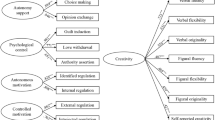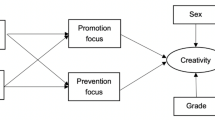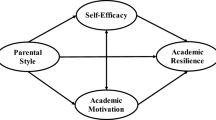Abstract
Drawing on social cognitive theory, need for cognition might have a significant influence on adolescents’ creative self-efficacy. However, no studies, to date, have investigated this relationship. To address this gap in the literature, this study used a 3-year longitudinal design to investigate the effect of need for cognition on adolescents’ creative self-efficacy. Moreover, to better understand this effect, we also investigated the mediating roles of perceived parenting behaviors and perceived teacher support, and the possible gender differences. The sample included 221 Chinese adolescents (mean age = 14.58, 48% girls) followed across 3 years. The results revealed that need for cognition had a beneficial effect on adolescents’ creative self-efficacy. Moreover, perceived parental autonomy support and perceived parental psychological control mediated the effect of need for cognition on creative self-efficacy. Lastly, there exist gender differences in these mediation effects. Perceived parental autonomy support only mediated the effect of need for cognition on boys’ creative self-efficacy, whereas perceived parental psychological control only mediated the influence of need for cognition on girls’ creative self-efficacy. Our findings help clarify developmental pathways linking need for cognition to adolescents’ creative self-efficacy, and the underlying mediation mechanisms.




Similar content being viewed by others
Data Availability
The datasets generated during and/or analysed during the current study are not publicly available due to the use of the follow-up research but are available from the corresponding author on reasonable request.
References
Bandura, A. (1986). Social foundations of thought and action: A cognitive social theory. Prentice-Hall.
Bao, Z., Li, D., Zhang, W., & Wang, Y. (2015). School climate and delinquency among Chinese adolescents: Analyses of effortful control as a moderator and deviant peer affiliation as a mediator. Journal of Abnormal Child Psychology, 43(1), 81–93. https://doi.org/10.1007/s10802-014-9903-8.
Barber, B. K. (1996). Parental psychological control: Revisiting a neglected construct. Child Develpment, 67(6), 3296–3319. https://doi.org/10.2307/1131780.
Barber, B. K., Bean, R. L., & Erickson, L. D. (2001). Expanding the study and understanding of parental psychological control. In B. K. Barber (Ed.), Intrusive parenting: How psychological control affects children and adolescents (pp. 263—289). American Psychological Association. https://doi.org/10.1037/10422-009.
Beghetto, R. A. (2009). Correlates of intellectual risk taking in elementary school science. Journal of Research in Science Teaching: The Official Journal of the National Association for Research in Science Teaching, 46(2), 210–223. https://doi.org/10.1002/tea.20270.
Beghetto, R. A., Kaufman, J. C., & Baxter, J. (2011). Answering the unexpected questions: Exploring the relationship between students’ creative self-efficacy and teacher rating of creativity. Psychology of Aesthetics, Creativity, and the Arts, 5(4), 342–349. https://doi.org/10.1037/a0022834.
Bower, G. H. (1992). How might emotions affect learning. In S. A. Christianson (Ed.), The handbook of emotion and memory: Research and theory (pp. 3—31). Lawrence Erlbaum Associates.
Brody, G. H., Stoneman, Z., & McCoy, J. K. (1992). Associations of maternal and paternal direct and differential behavior with sibling relationships: Contemporaneous and longitudinal analyses. Child Development, 63(1), 82–92. https://doi.org/10.1111/j.1467-8624.1992.tb03597.x.
Bye, D., & Pushkar, D. (2009). How need for cognition and perceived control are differentially linked to emotional outcomes in the transition to retirement. Motivation and Emotion, 33(3), 320–332. https://doi.org/10.1007/s11031-009-9135-3.
Cacioppo, J. T., & Petty, R. E. (1982). The need for cognition. Journal of Personality and Social Psychology, 42, 116–131. https://doi.org/10.1037/0022-3514.42.1.116.
Cacioppo, J. T., Petty, R. E., Feinstein, J. A., & Jarvis, W. B. G. (1996). Dispositional differences in cognitive motivation: The life and times of individuals varying in need for cognition. Psychological Bulletin, 119(2), 197–253. https://doi.org/10.1037/0033-2909.119.2.197.
Cavazos, J. T., & Campbell, N. J. (2008). Cognitive style revisited: The structure X cognition interaction. Personality and Individual Differences, 45(6), 498–502. https://doi.org/10.1016/j.paid.2008.06.001.
Cheung, G. W., & Rensvold, R. B. (2002). Evaluating goodness-of-fit indexes for testing measurement invariance. Structural Equation Modeling, 9(2), 233–255. https://doi.org/10.1207/S15328007SEM0902_5.
Choi, J. N. (2012). Context and creativity: The theory of planned behavior as an alternative mechanism. Social Behavior and Personality: An International Journal, 40(4), 681–692. https://doi.org/10.2224/sbp.2012.40.4.681.
Choo, H., Sim, T., Liau, A. K., Gentile, D. A., & Khoo, A. (2015). Parental influences on pathological symptoms of video-gaming among children and adolescents: A prospective study. Journal of Child and Family Studies, 24(5), 1429–1441. https://doi.org/10.1007/s10826-014-9949-9.
Deci, E. L., & Ryan, R. M. (2012). Motivation, personality, and development within embedded social contexts: An overview of self-determination theory. In R. M. Ryan (Ed.), Oxford library of psychology. The Oxford handbook of human motivation (pp. 85—107). Oxford University Press.
Dollinger, S. J. (2003). Need for uniqueness, need for cognition, and creativity. The Journal of Creative Behavior, 37(2), 99–116. https://doi.org/10.1002/j.2162-6057.2003.tb00828.x.
Dudley, M. G., & Harris, M. J. (2003). To think or not to think: The moderating role of need for cognition in expectancy-consistent impression formation. Personality and Individual Differences, 35, 1657–1667. https://doi.org/10.1016/S0191-8869(02)00388-4.
Elias, S. M., & Loomis, R. J. (2002). Utilizing need for cognition and perceived self-efficacy to predict academic performance. Journal of Applied Social Psychology, 32(8), 1687–1702. https://doi.org/10.1111/j.1559-1816.2002.tb02770.x.
Farmer, S. M., & Tierney, P. (2017). Considering creative self-efficacy: Its current state and ideas for future inquiry. In M. Karwowski & J. C. Kaufman (Eds.), Explorations in creativity research. The creative self: Effect of beliefs, self-efficacy, mindset, and identity (pp. 23—47). Elsevier Academic Press. https://doi.org/10.1016/B978-0-12-809790-8.00002-9.
Feldman, R. S. (2006). Development across the life span (4th ed.). Pearson Education New Zealand.
Forgeard, M. J., & Benson, L. (2019). Extracurricular involvement and psychological adjustment in the transition from adolescence to emerging adulthood: The role of mastery and creative self-efficacy. Applied Developmental Science, 23(1), 41–58. https://doi.org/10.1080/10888691.2017.1288124.
Frank, G., Plunkett, S. W., & Otten, M. P. (2010). Perceived parenting, self-esteem, and general self-efficacy of Iranian American adolescents. Journal of Child and Family Studies, 19(6), 738–746. https://doi.org/10.1007/s10826-010-9363-x.
Gauthier, K. J., Christopher, A. N., Walter, M. I., Mourad, R., & Marek, P. (2006). Religiosity, religious doubt, and the need for cognition: Their interactive relationship with life satisfaction. Journal of Happiness Studies, 7(2), 139–154. https://doi.org/10.1007/s10902-005-1916-0.
Gralewski, J., & Jankowska, D. M. (2020). Do parenting styles matter? Perceived dimensions of parenting styles, creative abilities and creative self-beliefs in adolescents. Thinking skills and creativity, 38, 100709. https://doi.org/10.1016/j.tsc.2020.100709.
Han, L., Sun, R., Gao, F., Zhou, Y., & Jou, M. (2019). The effect of negative energy news on social trust and helping behavior. Computers in Human Behavior, 92, 128–138. https://doi.org/10.1016/j.chb.2018.11.012.
Harman, H. H. (1967). Modern factor analysis. University of Chicago Press.
Harter, S. (2006). Self-processes and developmental psychopathology. In D. Cicchetti & D. J. Cohen (Eds.), Developmental psychopathology: Theory and method (pp. 370—418). John Wiley & Sons.
He, L., Zhuang, K., Li, Y., Sun, J., Meng, J., Zhu, W., & Qiu, J. (2019). Brain flexibility associated with need for cognition contributes to creative achievement. Psychophysiology, 56(12), e13464. https://doi.org/10.1111/psyp.13464.
Hughes, E. K., & Gullone, E. (2010). Reciprocal relationships between parent and adolescent internalizing symptoms. Journal of Family Psychology, 24(2), 115–124. https://doi.org/10.1037/a0018788.
Hung, S., & Lin, S. (2004, February). Whatever you say, I can do it—development of the Students’ Creative Self-efficacy Scale Paper presented at the 2nd Creativity and Innovation Conference, Taipei, Taiwan, Province of China.
Jia, Y., Way, N., Ling, G., Yoshikawa, H., Chen, X., Hughes, D., Ke, X., & Lu, Z. (2009). The influence of student perceptions of school climate on socioemotional and academic adjustment: A comparison of Chinese and American adolescents. Child Development, 80, 1514–1530. https://doi.org/10.1111/j.1467-8624.2009.01348.x.
Joey, F., Kim, J. J., Joel, J., Qiaobing, W., Chao, F., & Lau, A. S. (2017). Perceived social change, parental control, and family relations: A comparison of Chinese families in Hong Kong, mainland China, and the United States. Frontiers in psychology, 8, 1671. https://doi.org/10.3389/fpsyg.2017.01671.
Johansson, M., & Ölund, A. (2017). Thinking about thinking: A study of anxiety, neuroticism and Need for Cognition (Master’s thesis). Umea University, Umea, Sweden.
Kao, C. (1994). The concept and measurement of need for cognition. Chinese Journal of Psychology, 36(1), 1–20.
Karwowski, M. (2011). It doesn’t hurt to ask… but sometimes it hurts to believe: Polish students’ creative self-efficacy and its predictors. Psychology of Aesthetics, Creativity, and the Arts, 5(2), 154–164. https://doi.org/10.1037/a0021427.
Karwowski, M., & Barbot, B. (2016). Self-beliefs and creativity in developmental context. In J. C. Kaufman & J. Baer (Eds.), Cambridge companion to creativity in reason and development (pp. 302—326). Cambridge University Press.
Karwowski, M., Gralewski, J., & Szumski, G. (2015). Teachers’ effect on students’ creative self-beliefs is moderated by students’ gender. Learning and Individual Differences, 44, 1–8. https://doi.org/10.1016/j.lindif.2015.10.001.
Karwowski, M., & Lebuda, I. (2016). The big five, the huge two, and creative self-beliefs: A meta-analysis. Psychology of Aesthetics, Creativity, and the Arts, 10, 214–232. https://doi.org/10.1037/aca0000035.
Klem, A. M., & Connell, J. P. (2004). Relationships matter: Linking teacher support to student engagement and achievement. Journal of School Health, 74, 262–273. https://doi.org/10.1111/j.1746-1561.2004.tb08283.x.
Lavrijsen, J., Preckel, F., Verachtert, P., Vansteenkiste, M., & Verschueren, K. (2021). Are motivational benefits of adequately challenging schoolwork related to students’ need for cognition, cognitive ability, or both? Personality and individual differences, 171, 110558. https://doi.org/10.1016/j.paid.2020.110558.
Li, C., & Wu, J. (2011). The structural relationships between optimism and innovative behavior: Understanding potential antecedents and mediating effects. Creativity Research Journal, 23, 119–128. https://doi.org/10.1080/10400419.2011.571184.
Li, J. D., & Yu, J. Y. (2011). The correlation of teacher creativity-supportive behaviour, student creative self-efficacy and creative thinking. Journal of Ningbo University (Educational Science Edition), 33(2), 44–48.
Liang, C. C., & Yuan, Y. H. (2020). Exploring Children’s creative self-efficacy affected by after-school program and parent-child relationships. Frontiers in Psychology, 11, 2237. https://doi.org/10.3389/fpsyg.2020.02237.
Lin, Y., Durbin, J. M., & Rancer, A. S. (2016). Math anxiety, need for cognition, and learning strategies in quantitative communication research methods courses. Communication Quarterly, 64(4), 390–409. https://doi.org/10.1080/01463373.2015.1103294.
Luong, C., Strobel, A., Wollschläger, R., Greiff, S., Vainikainen, M. P., & Preckel, F. (2017). Need for cognition in children and adolescents: Behavioral correlates and relations to academic achievement and potential. Learning and Individual Differences, 53, 103–113. https://doi.org/10.1016/j.lindif.2016.10.019.
Meade, A. W., Johnson, E. C., & Braddy, P. W. (2008). Power and sensitivity of alternative fit indices in tests of measurement invariance. Journal of Applied Psychology, 93(3), 568–592. https://doi.org/10.1037/0021-9010.93.3.568.
Miller, A. L., Lambert, A. D., & Speirs Neumeister, K. L. (2012). Parenting style, perfectionism, and creativity in high-ability and high-achieving young adults. Journal for the Education of the Gifted, 35(4), 344–365. https://doi.org/10.1177/0162353212459257.
Muthén, B. O., Muthén, L. K., & Asparouhov, T. (2017). Regression and mediation analysis using Mplus. Muthén & Muthén.
Neuberg, S. L., & Newsom, J. T. (1993). Personal need for structure: Individual differences in the desire for simpler structure. Journal of Personality and Social Psychology, 65(1), 113–131. https://doi.org/10.1037/0022-3514.65.1.113.
Petty, R. E., & Jarvis, W. B. G. (1996). An individual differences perspective on assessing cognitive processes. In N. Schwarz & S. Sudman (Eds.), Answering questions: Methodology for determining cognitive and communicative processes in survey research (pp. 221–257). Jossey-Bass.
Preacher, K. J., & Hayes, A. F. (2008). Asymptotic and resampling strategies for assessing and comparing indirect effects in multiple mediator models. Behavior Research Methods, 40(3), 879–891. https://doi.org/10.3758/brm.40.3.879.
Puente-Díaz, R., & Cavazos-Arroyo, J. (2017). Creative self-efficacy: The influence of affective\states and social persuasion as antecedents and imagination and divergent thinking as consequences. Creativity Research Journal, 29(3), 304–312. https://doi.org/10.1080/10400419.2017.1360067.
Puente-Díaz, R., & Cavazos-Arroyo, J. (2018). An exploration of some antecedents and consequences of creative self-efficacy among college students. The Journal of Creative Behavior, 52(3), 256–266. https://doi.org/10.1002/jocb.149.
Ranney, R. M., Behar, E., & Zinsser, K. M. (2021). Gender as a moderator of the relationship between parental anxiety and adolescent anxiety and depression. Journal of Child and Family Studies, 30(5), 1247–1260. https://doi.org/10.1007/s10826-021-01931-5.
Roeser, R. W., Midgley, C., & Urdan, T. (1996). Perceptions of the school psychological environment and early adolescents’ self-appraisals and academic engagement: The mediating role of goals and belonging. Journal of Educational Psychology, 88(3), 408–422. https://doi.org/10.1037/0022-0663.88.3.408.
Rogers, K. N., Buchanan, C. M., & Winchell, M. E. (2003). Psychological control during early adolescence: Links to adjustment in differing parent/adolescent dyads. Journal of Early Adolescence, 23, 349–383. https://doi.org/10.1177/0272431603258344.
Rusting, C. L. (1998). Personality, mood, and cognitive processing of emotional information: Three conceptual frameworks. Psychological Bulletin, 124, 165–196. https://doi.org/10.1037/0033-2909.124.2.165.
Ryan, R. M., & Deci, E. L. (2002). Overview of self-determination theory: An organismic dialectic perspective. In E. L. Deci & R. M. Ryan (Eds.), Handbook of self-determination research (pp. 3—33). The University of Rochester Press.
Silk, J. S., Morris, A. S., Kanaya, T., & Steinberg, L. (2003). Psychological control and autonomy granting: Opposite ends of a continuum or distinct constructs? Journal of Research on Adolescence, 13(1), 113–128. https://doi.org/10.1111/1532-7795.1301004.
Soenens, B., Vansteenkiste, M., & Luyten, P. (2010). Toward a domain-specific approach to the study of parental psychological control: Distinguishing between dependency-oriented and achievement-oriented psychological control. Journal of Personality, 78(1), 217–256. https://doi.org/10.1111/j.1467-6494.2009.00614.x.
Steinberg, L. (2007). Adolescence (8th ed.). The McGrwa-Hill Companies.
Steinberg, L., Blatt-Eisengart, I., & Cauffman, E. (2006). Patterns of competence and adjustment among adolescents from authoritative, authoritarian, indulgent, and neglectful homes: A replication in a sample of serious juvenile offenders. Journal of Research on Adolescence, 16(1), 47–58. https://doi.org/10.1111/j.1532-7795.2006.00119.x.
Sun, C., Zhou, Z., Yu, Q., Gong, S., Yi, L., & Cao, Y. (2021). Exploring the effect of perceived teacher support on multiple creativity tasks: Based on the expectancy–value model of achievement motivation. The Journal of Creative Behavior, 55(1), 15–24. https://doi.org/10.1002/jocb.430.
Thompson, M. M., Naccarato, M. E., Parker, K. C. H., & Moskowitz, G. B. (2001). The personal need for structure and personal fear of invalidity measures: Historical perspectives, current applications, and future directions. In G. B. Moskowitz (Ed.), Cognitive social psychology: The Princeton symposium on the legacy and future of social cognition (pp. 19—39). Lawrence Erlbaum Associates Publishers.
Tierney, P., & Farmer, S. M. (2002). Creative self-efficacy: Its potential antecedents and relationship to creative performance. Academy of Management Journal, 45(6), 1137–1148. https://doi.org/10.5465/3069429.
van Rooij, E. C., Jansen, E. P., & van de Grift, W. J. (2017). Factors that contribute to secondary school students’ self-efficacy in being a successful university student. ReseaRch in Post-comPulsoRy education, 22(4), 535–555. https://doi.org/10.1080/13596748.2017.1381301.
Vidrine, J. I., Simmons, V. N., & Brandon, T. H. (2007). Construction of smoking-relevant risk perceptions among college students: The influence of need for cognition and message content. Journal of Applied Social Psychology, 37(1), 91–114. https://doi.org/10.1111/j.0021-9029.2007.00149.x.
Wang, Q., Pomerantz, E. M., & Chen, H. (2007). The role of parents’ control in early adolescents’ psychological functioning: A longitudinal investigation in the United States and China. Child Development, 78(5), 1592–1610. https://doi.org/10.1111/j.1467-8624.2007.01085.x.
Watts, L. L., Steele, L. M., & Song, H. (2017). Re-examining the relationship between need for cognition and creativity: Predicting creative problem solving across multiple domains. Creativity Research Journal, 29(1), 21–28. https://doi.org/10.1080/10400419.2017.1263505.
Zhang, H., Sun, C., Liu, X., Gong, S., Yu, Q., & Zhou, Z. (2020). Boys benefit more from teacher support: Effects of perceived teacher support on primary students’ creative thinking. Thinking skills and creativity, 37, 100680. https://doi.org/10.1016/j.tsc.2020.100680.
Zhang, J. H. (2020). Research on the relationship between openness to experience, conscientiousness and creative problem-solving: The mediating role of self-efficacy. Journal of Shandong Normal University (social sciences), 65(3), 72–81. https://doi.org/10.16456/j.cnki.1001-5973.2020.03.009.
Zhang, J. H., Liu, X., Ren, F. F., Sun, X. W., & Yu, Q. (2016). The effects of group diversity and organizational support on group creativity. Acta Psychologica Sinica, 48(12), 1551–1560. https://doi.org/10.3724/SP.J.1041.2016.01551.
Zhang, L., Zhang, G. C., Xie, S. F., & Li, Y. (2010). Research on relationship between mental health status and parental rearing styles in junior high school students. China Journal of Health Psychology, 18(3), 288–291. https://doi.org/10.13342/j.cnki.cjhp.2010.03.044.
Zhang, W., & Fuligni, A. J. (2006). Authority, autonomy, and family relationships among adolescents in urban and rural China. Journal of Research on Adolescence, 16(4), 527–537. https://doi.org/10.1111/j.1532-7795.2006.00506.x.
Zheng, L. K. (2009). The styles of parenting: Prediction of their influence on the development of children’s personalities. Psychological Science, 32(5), 1267–1269. https://doi.org/10.16719/j.cnki.1671-6981.2009.05.067.
Authors’ Contribution Statements
Peipei Chen: conceptualization, methodology, roles/writing-original draft, writing-review, and revision. Jinghuan Zhang: conceptualization, funding acquisition, supervision, writing-review, and revision. Naili Xu: revision and data analysis. Kaige Zhang: data analysis. Linjie Xiao: data analysis.
Consent to Participate
All the participants’ parents and themselves signed written informed consent.
Funding
This study was supported by the Key Special Project of National Key Research and Development Program of China (2017YFB1400100) and National Natural Science Foundation of China (31771235).
Author information
Authors and Affiliations
Corresponding author
Ethics declarations
Ethics Approval
All procedures performed in studies involving human participants were in accordance with the ethical standards of the institutional and national research committee and with the 1964 Helsinki Declaration and its later amendments or comparable ethical standards. The study was approved by the Ethics Committee of Shandong Normal University.
Conflicts of Interest/Competing Interests
The authors have no conflicts of interest to declare that are relevant to the content of this article.
Additional information
Publisher’s Note
Springer Nature remains neutral with regard to jurisdictional claims in published maps and institutional affiliations.
Rights and permissions
About this article
Cite this article
Chen, P., Zhang, J., Xu, N. et al. The relationship between need for cognition and adolescents’ creative self-efficacy: The mediating roles of perceived parenting behaviors and perceived teacher support. Curr Psychol 42, 7812–7825 (2023). https://doi.org/10.1007/s12144-021-02122-7
Accepted:
Published:
Issue Date:
DOI: https://doi.org/10.1007/s12144-021-02122-7




